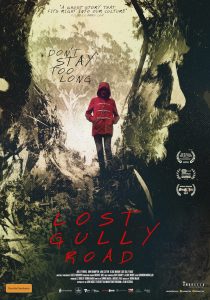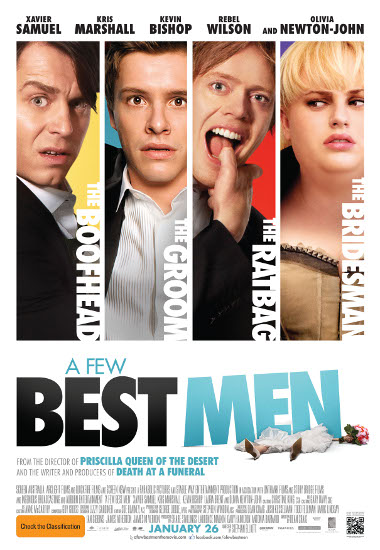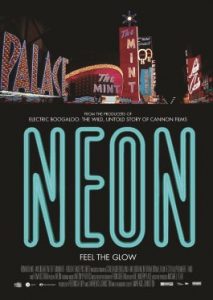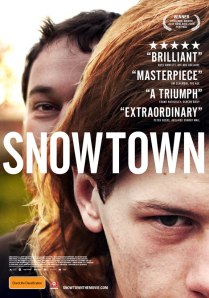There’s a sense of deja-vu as I park the car on the way to interview Donna McRae for her new film Lost Gully Road. Standing in the middle of the car park with my bag slung over shoulder, thoughts turn to how many times I must have repeated this act. I’m at my alma mater, Deakin University in Burwood, two years after I graduated and some things hardly change; empty spaces in the car park around exam time remain elusive.
The day is overcast and bitterly cold, yet with hints of the sun trying to poke through the layers of cloud cover, the kind of schizophrenic indecision that only Melbourne weather is capable of. Walking past the parking meter I realise I haven’t got a ticket yet. Old habits die hard, as it’s likely my degree was partly financed by the sheer amount of parking fines I acquired over those three years.
Lost Gully Road, McRae’s second feature as director, is a deceptively simple horror film with a lot on its mind. Lucy – in what might be a star making performance by Adele Perovic – flees the city and gets accommodation in a small cabin in the woodlands. As the isolation and past trauma begin to take their toll she’s obliged to confront the forces, both psychological and supernatural, that haunt her in this remote part of the Dandenongs.
I sit down with Donna in a small cafe. Her hair is split into two pony tails, each on a side of her face. Adorned with a green overcoat and dark glasses she looks like a cross between someone’s cool aunt and a grown up Daria. This is the first time we’ve officially met each other and sitting down to a cup of mediocre university coffee, the academic Blood of Christ, seems like a good introduction.
I remember walking out of the theatre and it was really dark and spitting down rain. Quite eerie after seeing the film, a perfect way to see the night out. […] Did you get a grant to make this film or is this a story that you’ve wanted to make for a while?
I was at Fantasia Film festival at Montreal with the Kate Kelly project [McRae’s next film, about Ned Kelly’s little sister]. When I came back I realised that I had to make something, because my first feature Johnny Ghost came out in 2012 and it wasn’t as current as I wanted.
So I mentioned to Michael [Donna’s husband and Production Designer Michael Vale, who also happens to be an internationally renown local artist] across the kitchen table ‘I think I should make a film’. We, being silly, decided to make another feature. I’d just started working at Deakin and I knew that I could get equipment and could keep the costs down. I’d been saving up to do another film anyway, so that’s how Lost Gully was born.
Probably about five years before that, or maybe a little longer, I’d done a short with a similar theme about this woman who lived in a house and she was visited by a ghost who gave her flowers and all this kind of stuff. The ending was quite nasty. That was something that I would like to explore in a longer form.
Have ghosts always been something that interests you?
Always. My previous film Johnny Ghost was obviously about a ghost. At film school I made a ghost film. I really enjoy that kind of story telling, all my favourite films usually have ghosts in them. I did a PhD which was about the ghostly medium of cinema and the fact that you can tell so many great stories by using a ghost as representation of something. It can be used as a metaphor or allegory or whatever, or it can be in a love story like Ghost.
Have you always enjoyed telling stories? I read in one interview that you’re an only child, I am as well, and growing up in that environment usually means that stories become a big part of your life, as company. Most only children have good imaginations for this kind of thing.
Yes! It’s a very fertile ground, because you haven’t got anyone else to talk to. You probably read in the same interview that I loved Casper the Friendly Ghost. As I think back on it, ghosts have always been a part of it. I remember in primary school we all sat around and told ghost stories. We didn’t really know what they were but there was this nun who was telling them with us, all those horror stories and urban myths. They were just fun, always elevated more so than normal life. Dickens, Shakespeare… It’s a really great way to tell stories.
The coffees arrive. I contemplate how to approach what I ask next as Donna sips on a turmeric latte, which the barista had topped with too much yellow froth. The epidemic of violence against women continues across Australia, and the topic has become a major factor in local conversation and culture, which is leaking into the the art being produced. Lost Gully Road, featuring a woman fleeing an abusive boyfriend only to fall into the clutches of something even worse, is the latest take on the issue.
Going back to Violence against Women. You’re an educated woman who has seen the change over the last ten years. We’ve identified the issue, it’s a topic that people should and do get angry about. In your reckoning how do we move past recognition of this issue and move towards effective action? Is this something you’ve thought about?
It’s education. People, friends and family can’t stand by anymore, they need to call this behaviour out. It’s great that there’s this campaign at the moment about calling your mates out. If you’re talking about your wife like she’s a piece of shit, your mates should be speaking up about it. They’re the kind of steps that we need, to all be protective in calling this behaviour out. It starts at home. Mums and Dads, everyone needs to press on their children, and boys in particular, that you can’t speak about people that way. What happens if you’re in a situation with domestic violence, how do you get out of that? It’s a complex issue. What I find teaching here, I see a lot of young men and women interacting together and usually I’m pleasantly surprised by the respect that the boys have for the girls. It’s really nice to see, especially at a university where everyone is educated and can think about topics like this.
That’s wonderful to hear.
Adele Perovic – what a find she is. Was finding the right actor for that role difficult? She doesn’t get a lot of lines so it’s all about physicality and presence on screen. Was it a hard find or did she stumble into it?
No it wasn’t actually, considering what I would have had to go through if she wasn’t perfect. László Baranyai our cinematographer actually recommended her.
I looked at three people and Adele was in Sydney at the time so we Skyped. She sent me a tape and she was just perfect. The way that she sent the tape was very casual and constrained, she did a couple of scenes. The perfect, kind of, “Millenial”, she’s got this casual feel to her, didn’t really care if she got it or not. That was exactly the kind of qualities we were looking for. I’d also seen her on The Cove on Channel 2, where she played a big supporting role and she was fantastic in that. I knew she could act. It was just if the project fitted her, so I really lucked out.
I wrote in my notes when I was watching the film, in terms of a character and an actor coming together it’s a perfect meshing of the two. I also read that there was no rehearsal, so it’s astonishing that she could hold it together that well.
The process is not for everybody […] Put the actor in the moment and just see what happens. The lack of rehearsal was mainly financial constraints, we couldn’t afford any longer than a two week intensive shoot. But to be in the moment, her just feeling real and the way she interacts with the house, with the noises and the phone calls. If we had have rehearsed I think it would have been a little bit stale if she’d already done it.
We needed it to be kind of fresh and her going through the film like she would normally, in her own life. We talked about the character at length, I said to her on the Friday when she came down ‘Well it’s yours now. You can do what you want with it.[…] that’s how we got that enormous rawness and intensity in the film. She just felt the whole way through. It was beautiful.
 You mentioned the cabin. Are you familiar with the Dandenongs?
You mentioned the cabin. Are you familiar with the Dandenongs?
I’ve got some friends who live up there, but I’d never been up to Kalorama before.
One of the third years used that location for their film, and we were looking for locations and saw that. I asked one of them and they said that the owner was really open to it. So she hooked us up. He said ‘Yeah, I love horror films’. It was great. I’d never been up that particular way. You get to a certain part and the internet cuts off, there’s no one around. I’d be a nervous wreck living there (laughs).
Is the house an AirBNB?
No
So someone actually lives there?
Yeah, he moved out for two weeks. He came back for the weekend. We actually painted one of the walls in the bedroom a really dark colour so we’d get what we wanted and rearranged a few of his paintings, and he’s left it like that.
Do you know if he’s seen the film?
He has, he came to one of the screenings at the Nova. He loved it. We were all like ‘Oh God, what’s he going to think?’, but he loved it.
That leads me to another question I wanted to ask. When you have an Archibald nominated artist working on your production design you know you’re in good hands. How important was getting the look of the film?
We do things together. We went up and basically let the location guide us. There was no point implying anything onto it until we saw where we were. Then we just wanted it to be, kind of… other worldly, kind of gothic and ghostly but entrenched in this forest. He just sort of walked around, looking. He didn’t really say much and then came a few days later and said “I’ve got this student, she’s got a duffle jacket and that’s the one we’re going to use”
I was actually going to ask, whose idea was the brilliant red coat? It’s a such a beautiful image of her walking through the bush in it.
It’s great complimentary colours, but what he was looking at when walking around the location was all the birds. There’s a shot of a parrot in the film, and it was the same colour as the duffle jacket. It’s these natural colours that exist in the forest.
Are you a fan of horror films personally?
Yeah.
When you’re writing a horror film you know there’s a lot of tropes and conventions that need to be incorporated into a script. How do you work with those but bring your own originality?
That’s an interesting question. I really enjoy ghost films more-so than horror. But i’m really up for psychological horror and supernatural thrillers, more-so than slashers and torture porn.
When I watch a film I want story and atmosphere and really good visuals. They’re the kind of things that I try to put in my films, so I just do it. I’m a big fan of Kelly Reichardt, I really love Tarkovsky, stuff like that. I use long takes because I really feel I need to dive into the action instead of seeing all these cuts and seeing time passing like that.
But I’m very aware that the audience needs those horror tropes to get a kick out of it. I try to part them, and I know that this film and Johnny Ghost are not horror as such – they’re not flashing horror, five kills per minute, and I know that some people may be dissatisfied, because that’s what they were looking for, but that’s the risk you’ve got to take to work in the genre.
But the genre really interests me because you can say anything you want and wrap it up in these genre tropes and get the audience to get there. Like, if I’d just written a film about a girl staying in a house, then getting beaten up and murdered… Who would come?
Did you rewatch any of your favourite films or did you research anything when writing this?
I usually watch, and what I think is a classic very well crafted, well made film is The Woman in Black (The Daniel Radcliffe one) I loved the first one, the TV movie, and I was in London recently and saw the play. They’re all completely different. To me the pacing and that beautiful Hammer style of the 1970s is in The Woman in Black.
People also said that my film reminded them of Roman Polanski’s Repulsion. I didn’t actually watch that, but I’d watched it quite a few times because I really love that film too. Also, when I’m thinking about directing I watch the Spanish film Orphanage. I think that’s a masterpiece of suspence. J. A. Bayona.
Films like The Innocents, The Ghost and Mrs. Muir, The Haunting. They’re my go to films to watch because I love them to pieces. I could watch them over and over again.
– – –
Lost Gully Road has been nominated for “Best Indie Film” (Under $2M) at the AACTA Awards. Released on DVD and streaming in Australia from 3rd October through Umbrella Entertainment.




